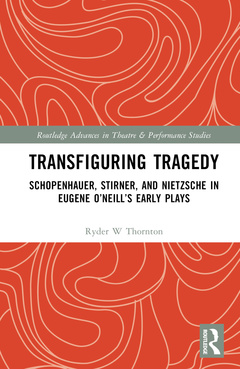Transfiguring Tragedy Schopenhauer, Stirner, and Nietzsche in Eugene O’Neill’s Early Plays Routledge Advances in Theatre & Performance Studies Series
Auteur : Thornton Ryder W

This book demonstrates Eugene O?Neill?s use of philosophy in the early period of his work and provides analyses of selected works from that era, concluding with The Hairy Ape, completed in 1921, as an illustration of the mastery he had achieved in dramatizing key concepts of philosophy.
Analyses of one-act and full-length plays from 1913 to 1921 reveal the influence of the three philosophers and establish that O?Neill was fundamentally a philosophic playwright, even from his earliest dramatic sketches. Specific concepts from Schopenhauer, Stirner, and Nietzsche went into O?Neill?s shaping of character arcs, dramatic circumstances, symbology, and theme. Among them are Schopenhauer?s concept of will and representation, Stirner?s notion of possession, and Nietzsche?s principle of the Apollonian-Dionysian duality. These ideas were foundational to O?Neill?s construction of tragic irony apparent in his early period plays. The critical concepts of these three philosophers are the major pathways in this study. However, such an approach inevitably reveals other layers of spiritual influence, such as Catholicism and Eastern philosophy, which are touched on in these analyses.
This book is a much-needed introduction to philosophic concepts in Eugene O?Neill?s early work and would be of great interest to students and scholars in theatre studies and philosophy.
Acknowledgements
Introduction
Chapter 1. Suffering and Solace: Nietzsche and Schopenhauer in the Early One-Act Plays
Chapter 2. Rites of Passage: Suffering, Illusion and Possession in the Glencairn Plays
Chapter 3. Tragedies of Ownness: Stirner’s Philosophy of Egoism in the First Full-Length Plays
Chapter 4. Drums and the Man: Ceremony, Power, and Race in The Emperor Jones
Chapter 5. “New Forces Out of the Old”: Nietzsche, Stirner, Christian Symbolism, and Vedantic Philosophy in “Anna Christie”
Chapter 6. Apes and Ghosts: Philosophy, Tragedy, and Comedy in The Hairy Ape
Afterword
Bibliography
Index
Ryder Thornton is a Senior Professor of Practice in the Department of Theatre and Dance at Tulane University, USA.
Date de parution : 07-2024
15.2x22.9 cm
Thèmes de Transfiguring Tragedy :
Mots-clés :
Eugene O’Neill; theatre studies; philosophy; Schopenhauer; Stirner; Nietzsche


